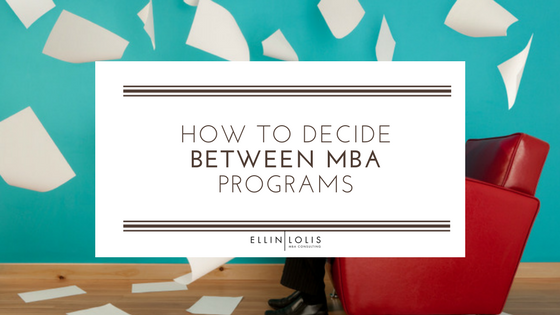How to decide between MBA programs
Are you between MBA programs? Now that Round 2 admissions decisions have been released, many candidates find themselves in a wonderful position — having to choose between multiple admits. If this is you, congratulations!
But after the initial euphoria of having been accepted into multiple MBA programs sinks in, the reality of having to make this difficult, life-changing decision sinks in. How do you really choose the best MBA program?
This time of year, I have the pleasure of working through this process with clients. As our methodology focuses a great deal on coaching to make sure our clients create careers and lives they love in parallel with the MBA, we believe deciding where to go is essential to reach short term and long term personal and professional goals.
So, we hope the following questions we successfully use with our clients to help them make this all-important decision can help you!

#Between MBA programs: Guiding Questions to Consider
1 — How important is ranking to you and to your future goals?
Though we encourage students to apply for schools that are in line with their values, as well as with their objectives, there is no denying that brand matters. However, it tends to matter more in certain contexts than others. If you want to pursue a bulge bracket financial institution or a top consulting firm, having a top brand on your CV will help you during the recruiting process. If you work in your family business and are going for the experience, on the other hand, brand may be less important.
2 — Where do people from each program end up industry wise and company wise?
Schools release employment reports each year, which detail the industries and jobs their graduates pursued after graduation, as well as the salaries and bonuses students in each of these areas received. If you are targeting a particular company or industry, it is a good idea to check different programs’ employment reports to see what kind of access you will have to the companies you are interested in.
3— Is one school financially more viable than the other?
Scholarships are powerful motivators, and schools know they can use scholarships to convince students who would normally go to a competitor’s school to attend their program instead. If finances are a big concern for you and you don’t see yourself going into an area that will allow you to pay back your debt comfortably, going to a school that offers you a scholarship could be a excellent move. However, if the scholarship is very small or if you are in a position where ranking is a key factor, scholarships could and perhaps should play less of a role in your decision.
4 — Do you have a geographical preference?
If relocating to a new country is a key priority for you, it’s a good idea to consider the visa policies in different target countries. Countries like Japan and Australia make it much easier to obtain work permits post MBA than the United States, for example.
On a more local note, it is also a good idea to check into the connections your programs have with the community. If you are going to rely on the school’s help getting a local job, this should factor into your decision.
5 — Are you looking for a stretch experience, or a community of like-minded individuals?
As you likely discovered during your research and application phases, each school has a different community and different values. This is the all important “fit” you so carefully showed in your applications. Since not every school is the same, our clients are often unsure how to choose between very different school cultures.
Learn more about… HOW TO FINANCE YOUR MBA
What we usually recommend is to decide if you are looking for a stretch experience, or for a community of like-minded individuals. If you are looking for a stretch experience, perhaps choose a community full of people whose strengths are different from yours, as this will give you a great chance to grow. If you prefer to find your “place” and interact with people who are similar to you, choose a school where candidates share many of your strengths.

#Between MBA programs:
What if I’m still not sure? — Your Plan of Attack.
1 — Visit campus (if you haven’t) or attend admitted student weekends on campus
Visiting campus is a step we encourage all candidates to take at some point during their MBA application process, as often what looks one way on paper is totally different on campus. If you weren’t able to visit previously or if you’re still not sure about what to do, many schools offer admitted student weekends on campus that bring together a large group of your potential future classmates. It’s a great way to evaluate (or revaluate!) how you like each school’s campus, and is an excellent chance to see the types of professionals you’ll be studying with after arriving.
2 — Attend meet ups in your area
Even if you have already visited or intend to travel to campus for an admitted student weekends, try to visit admitted student meet ups in your area. Especially for international students who aren’t able to visit the schools personally, this can be a great chance to get a feel for what kind of professionals you will be studying alongside and will give you a sneak peek of the network you will have post-MBA in your area.
3 — Speak to as many students and alumni as you can
You likely already spoke to many students and alumni during the research and application periods, but don’t stop now! Ask contacts to put you in touch with their friends and with their contacts inside the school. Talking to a large group of students and alumni will give you more insights into the school, its pros, and its cons, which is essential information as you make this decision.
4 — Make a list of what differentiates the programs you are deciding between.
It may sound silly, but actually sitting down to put pen to paper and writing down what you like and dislike about each program can make things much clearer and concrete.
5 — Trust yourself!
At the end of the day, it can be a great idea to follow your intuition. As you research and talk to people, you’re intuitively forming a gut opinion about the school your head may not have realized yet. Trust your instincts!
Did you know we are available on an hourly basis to act as a sounding board and ally for you in evaluating your opportunities? If you would like to discuss your case in particular, please get in touch with us!
Real MBA Essays That Got People In
School-specific sample essays that got our clients accepted





